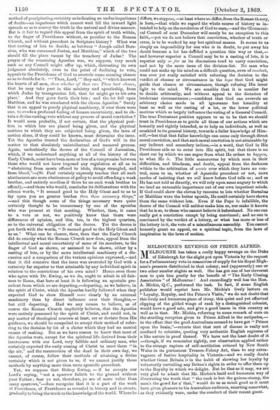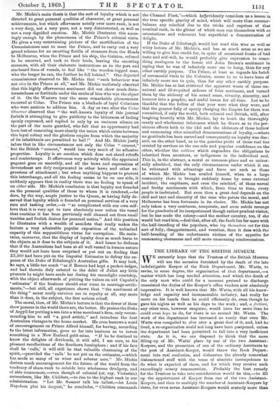MELBOURNE'S REVENGE ON PRINCE ALFRED.
TELBOURNE has taken a really happy revenge on the Duke IlL of Edinburgh for the slight put upon Victoria by the request for a Parliamentary vote in committee of supply for his Royal High- ness's presents distributed in that colony, and (apparently) one or two other smaller slights as well. She has got one of her cleverest men to quiz him gently for the benefit of "The Early Closing Association" of Melbourne I And exceedingly well has the Hon. A. Michie, Q.C., performed the task. In fact, if some English publisher would reprint here Mr. Michis's lively lecture on "Loyalty, Royalty, and the Prince's Visits," we do not doubt that this lively and humorous piece of irony, this quiet and yet effectual clipping of the gilded wings of rank by a distinguished colonist, would have a good sale, and give a good lesson in this country as well as in that. Mr. Michie, referring to some remark of ours on the startling reception given to Prince Alfred in the antipodes,— to the effect that the good Australians seemed to have got "Prince upon the brain,"—retorts that that sort of disease is really not confined to colonists, quoting very authentic English raptures of a like nature in proof thereof. We have .not the least doubt of it —though, if we remember rightly, our observation applied rather to the strange rapture of self-mutilation evinced by New South Wales in its portentous Treason-Felony Act, than to any extra- vagance of festive hospitality in Victoria—and we really doubt whether Great Britain is in the habit of showing her loyalty by voluntarily curtailing any Briton's rights in order to offer them up to the Royalty in which we delight. But be that as it may, we are very glad to admit that Mr. Michie's lucid and humorous way of illustrating the truth that "the rank is but the guinea-stamp, the man's the gowd for a' that," would do us as much good as it must have given pleasure to his Australian audience, smarting somewhat, as they evidently were, under the conduct of their recent guest. Mr. Michie's main thesis is that the sort of loyalty which is not directed to great personal qualities of character, or great personal achievements, but which effervesces noisily over mere rank, is not a very deep, not a very pure, not a very disinterested, as well as not a very dignified emotion. Mr, Michie illustrates this amus- ingly enough by the phenomena of the Prince's colonial visits. He gives a very entertaining picture of the mortification of the Commissioners sent to meet the Prince, and to carry out a very grand scheme for an escorting flotilla of steamers from the Heads to Melbourne, when the Prince and his ship, the Galatea, refused to be escorted, and took to their heels, leaving the escorting steamers, with all their elaborate instructions as to the port and starboard lines of vessels, to feel like "the wooden-legged man, who the longer he ran, the further he fell behind." One dejected commissioner observed to Mr. Michie that "such behaviour was not nice in the Prince at all," and Mr. Michie uniformly observed that this highly effervescent sentiment did not show much disin- terestedness or fortitude under the snubs of him who was the object of it. On the Western tom' the same remarkable phenomenon recurred at Colac. The Prince ran a blockade of loyal Colacians who were anxious to address him. A day or two after the Colac Observer observed that "the well-known loyalty of this journal forbids it attempting to give publicity to the bitterness of feeling openly expressed, and replied to only by an ominous silence on the part of the more guarded, who felt that an opportunity had been lost of cementing more closely the union which exists between this loyal colony and the glorious empire from which the majority of its inhabitants are permitted to hail !" And Mr. Michie justly infers that in like circumstances not only the Colac "cement," but the British "cement," would lose very much of its adhesive properties. Loyalty is an emotion which does not stand rebuffs and contretemps. It effervesces very actively while the appointed pageant goes on smoothly, and all the bows and expressions of devotedness are duly reciprocated in other bows and other ex- pressions of attachment ; but when anything happens to prevent this interchange, and all the feeling seems to be on one side, it suddenly appears that in reality there was no feeling to speak of on either side. Mr. Michie's conclusion is that loyalty not founded on the personal qualities of those to whom it is rendered,—he does, by the way, ample justice to the Queen, as having fully de- served that loyalty which is founded on personal services of a very care and tasking order,—is "so complicated with our own self- love that it is very apt to turn absolutely sour unless the vessel that contains it has been previously well cleaned out from small vanities and foolish desires for personal notice." And this position he illustrates with a wealth of anecdote that really makes the lecture a very admirable popular exposition of the unlimited capacity of this supposititious virtue for corruption. He main- tains, moreover, that the display of loyalty does as much harm to the objects as it does to the subjects of it. And hence he deduces that if the Australians had been at all well versed in human nature they would not have been surprised or put out on finding that 13,500 had been put on the Imperial Estimates to defray the ex- pense of the Duke of Edinburgh's Australian gifts. It may look, he says, a little too much "as if Romeo had kept a pocket-ledger, and had therein duly entered to the debit of Juliet any little presents he might have made her during his moonlight courtship, with the object afterwards of putting the values on old Capulet's 4 estimates ' if the business should ever come to marriage-settle- ments,"—but still, all experience shows that "the sentiment of the thing" never really survives use in royalty at all, any more than it does, in the subject, the first serious rebuff.
The moral, then, of Mr. Michie's lecture is that the fewer of these show persons in the world there are, the better. He praises the Duke of Argyll for putting a son into a wine merchant's firm, only recom- mending him to sell "a good article," and introduce the best Australian vintages to the home market. He even bestows a word of encouragement on Prince Alfred himself, for having, according to the latest information, gone so far into business as to invest something in a New Zealand gold-mine. "If he be destined to know the delights of dividends, it will add, I am sure, to his pleasant recollections of the Southern hemisphere ; and if his fate shall be calls,' it will still be that valuable chastening of the spirit,—provided the ' calls ' be not put on the estimates,—which has made so many of us wiser and soberer men." Mr. Michie derives much encouragement for the future of the world from the tendency of sham-rank to subside into wholesome drudgery, and of able commoners,—even though of colonial (or, say, Victorian) antecedents, like Mr. Childers,—to rise to the highest rank in our administration. "Let Mr. Sumner talk his tallest,—let Louis Napoleon plot his deepest," he concludes, "Childers commands
the Channel Fleet,"—which he/evidently considers as a lesson in the true specific gravity of mind, which will more than counter- balance any mischief due to the tricks and caprices of that nominal rank, in the glitter of which men sun themselves with so ostentatious and vehement but superficial a demonstration of delight.
If the Duke of Edinburgh would but read this wise as well as witty lecture of Mr. Michie's, and has as much sense as we are willing to give him credit for, in spite of occasional freaks of bad taste and self-will, he would probably give expression to some- thing analogous to the heroic old John Brown's sentiment in saying that he was of infinitely more use to hang, than for any other earthly purpose. The Prince, at least as regards his batch of ceremonial visits to the Colonies, seems to us to have been of infinitely more use to quiz, than for any other earthly purpose. Mr. Michie has at last retrieved the apparent waste of those un- natural and ill-requited ardours of false sentiment, and turned them by the alchemy of his sound sense, vivacity, sincerity, and humour into a graphic, and useful lesson for all time. Let us be thankful that the follies of that year were what they were, and that the greater folly of openly charging the Empire for them was committed, if only the world, both colonial and British, will, after laughing heartily with Mr. Michie, lay to heart the thoroughly manly and wholesome inferences which he draws as to the per- nicious effects both to the idol and the idolaters of those hollow and unmeaning rites miscalled demonstrations of loyalty,—where no gratitude has been earned and consequently no loyalty was due ; and, on the other hand, as to the genuine profit of those real ties created by services on the one aide and popular confidence on the other, whether the noblesse which engenders the obligations be inherited from ancestors, or indigenous in the individual soul. This is, in the abstract, a moral so common-place and so univer- sally admitted, that the only circumstances under which it can be reiterated with advantage and force are such as those of which Mr. Michie has availed himself, when to a large community there is brought suddenly home by some external incident, the emptiness, and even the mischief, of those unreal and frothy sentiments with which, from time to time, every people is inebriated. But even then a great deal depends on the skill and tact and sincerity of the man who points the moral, and Melbourne has been fortunate in its choice. Mr. Michie has not only taken a very courteous, temperate, and even subtle revenge for the gaucherie of its inexperienced though rather prudent visitor, but he has made the colony—and the mother country, too, if she would but read him,—feel that, after all, the fault lies far more with the half-breeding of the populace, who /ay themselves out for this sort of folly, disappointment, and vexation, than it does with the half-breeding of the unfortunate victims of the appetite for unmeaning obeisances and still more unmeaning condescensions.































 Previous page
Previous page